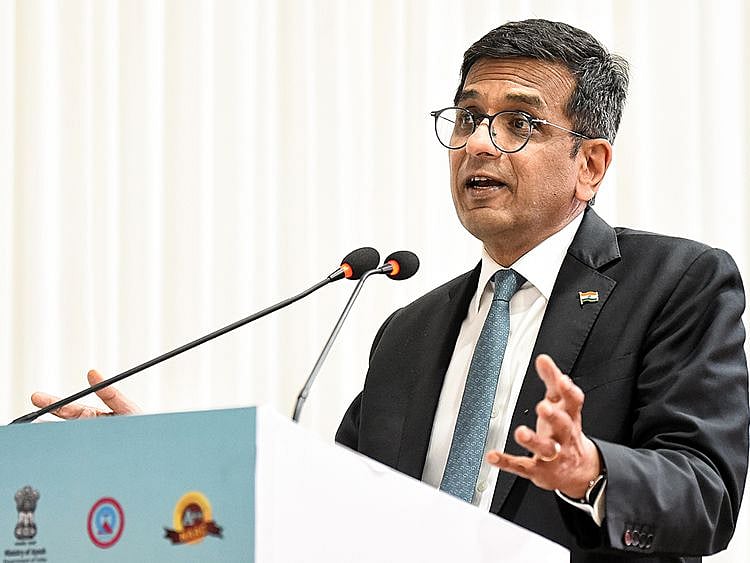Hope is a powerful emotion; it encourages a feeling that the right thing will be done. Two years ago, when India’s new chief justice D.Y. Chandrachud took oath of office he brought with him a similar assurance.
He was a judge who was not afraid to ‘dissent’ and came with a promise of speaking for the voiceless whose ambit had spread beyond the marginalised under the BJP rule. More than that he was seen as the saviour of an institution that had cast its lot and reputation as an extended arm of the executive.
As he took responsibility for the highest court of justice in the country — a post his father held once — democratic principles and India’s fundamentals of pluralism floundered around him. So, when Justice Chandrachud pronounced that ‘dissent is the safety valve of democracy,’ a collective sigh was released.
Perhaps it was the baggage of expectations. Did we read more into it simply because we wished it? Or it could be the magnitude of the required course correction. Either way, the tenure of India’s longest-serving chief justice in fourteen years has been an opportunity lost. Perhaps the saddest reflection of his legacy is that in contrast to the optimism a couple of years back, his time is ending with indifference.
Justice Chandrachud has been at pains to enumerate that the Supreme Court’s role was ‘not of the Opposition in Parliament.’ However, similar to his recent predecessors he has not been able to shrug off the tag of a ‘friendly’ apex court.
Also Read
Unmasking P. Diddy: Reckoning for the rich and powerfulOn a hunger strike: A climate activist fights for futureKashmir Election Results: The road ahead in the valleyA new normal
Questions over judicial independence were raised when Calcutta High Court judge Abhijit Gangopadhyay who had given a series of judgements against the ruling Trinamool Congress in West Bengal resigned and joined the BJP overnight. As the leader of the pack, the onus was on the chief justice to set in stone a cooling-off period. Instead, this is also a new normal.
A recent tragedy irrevocably taints his legacy. The death of human rights activist G N Saibaba brought out the chasm between CJI’s words and reality. Justice Chandrachud did not tire of reminding society and the judiciary that ‘bail is the rule, jail the exception.’ Yet, the wheelchair-bound Saibaba was denied bail for several years in a country where a murder and rape convict Gurmeet Ram Rahim has been out on parole 11 times in two years.
Saibaba who had a 90 per cent disability since childhood spent nearly a decade in jail despite a high court quashing all charges against him. The Supreme Court suspended the order and held a special weekend hearing to keep him in jail. The long ordeal and the mistreatment by authorities impacted his health and barely months after his release the former professor passed away at 54. He was not convicted of any offence. This mockery of justice was on Justice Chandrachud’s watch.
Some would argue at least he was better off than the 84-year-old jailed tribal activist Stan Swamy who was suffering from Parkinson’s and yet denied even a straw to drink water. He died incarcerated. The ‘the people’s court’ that Justice Chandrachud refers to is broken. Sadly, he too couldn’t fix it. ‘Justice should not only be done but also be seen to be done,’ every time the CJI spoke he had our attention. When it mattered, the erudite Chief Justice flattered to deceive.
To be, or not to be
In Shakespeare’s words, ‘To be, or not to be — that is the question.’ Bulldozers destroyed homes and livelihoods, pillars and machinery of democracy bowed and a man, student activist Umar Khalid continues to spend time without trial in jail. He has been incarcerated for more than 1500 days; his bail plea has been adjourned 14 times by the top court. Delhi police lodged two cases against Khalid, one of which was dropped while he is yet to be charged in the second case.
There have been exceptions and contradictions, the belated striking down of the electoral bonds scheme, but not restoring an elected government in Maharashtra while calling its removal illegal.
Away from the political arena, his judgements were progressive. From the right to privacy as a fundamental right and extending abortion rights to unmarried women, he delivered but will unfortunately be remembered more for the judiciary’s challenge of fair play and (dis) honourable mentions.
Then there’s the hand of God. As CJI Chandrachud prepares to leave office, his admission of asking for divine intervention to resolve some of India’s most crucial cases has done little to enhance his reputation.
Ironically, faith, the kind citizens have in their judiciary is chipping away as lines between the judiciary and executive are further reimagined. Beyond all symbolism, Justice Chandrachud’s everlasting legacy will be how he had promises to keep but left behind woods that are still dark and deep.
Network Links
GN StoreDownload our app
© Al Nisr Publishing LLC 2026. All rights reserved.
